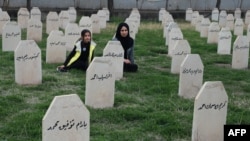On March 16, 1988, the regime of then-President of Iraq, Saddam Hussein, committed one of the worst atrocities of the modern era: the murder by poison gas of thousands of Iraqi civilians in the Kurdish-Iraqi town of Halabja.
In 1988, Saddam Hussein initiated the al-Anfal campaign, a scorched earth policy aimed at silencing or eliminating rebellious ethnic minorities in northern Iraq. He charged his cousin, Ali Hassan al-Majid, with executing it. Al-Majid decided to eliminate much of the Iraqi-Kurdish population.
On that March day, some 3,500 to 5,000 people died in Halabja, poisoned by nerve agents dropped from military aircraft. It was the first time in modern history that a government attacked its own people with chemical weapons.
Ali Hassan al-Majid, known from then on as Chemical Ali, went on to commit more atrocities, including a bloody suppression of a 1991 uprising of Shia Muslims.
When the regime of Saddam Hussein toppled, Chemical Ali was captured, tried by the Iraqi Special Tribunal and found guilty of committing genocide and crimes against humanity. Chemical Ali was executed by hanging. The Tribunal dropped charges against Saddam Hussein himself only because he was executed after being convicted in a separate case.
The same court also sentenced to 15-year prison terms the Minister of Defense at the time of the bombing of Halabja, as well as the then-head of military intelligence.
It is said that the wheels of justice turn slowly but grind exceedingly fine. The killers of Halabja got what they deserved. Their fate should, and does, serve as a warning to others of their ilk.
Nonetheless, the regime of Bashar al-Assad in Syria has failed to heed the lessons of Iraq. Since the beginning of the unrest in Syria in 2011, Syrian Arab Armed Forces and pro-Assad paramilitary forces have conducted more than 300 chemical attacks against the civilian population. Like Saddam Hussein and Chemical Ali before him, Bashar al-Assad used poison gas against his own people, killing thousands.
The head of any government has a responsibility to act in the best interest of his people. Saddam Hussein and Chemical Ali paid the price for the atrocities they committed in their quest to tighten their grip on power. Al-Assad should consider that ultimately, few dictators die in bed, or exit the scene of their crimes gracefully.














